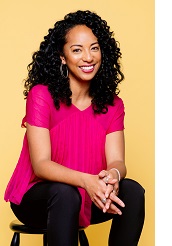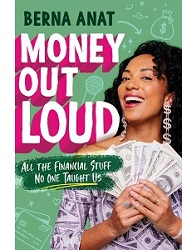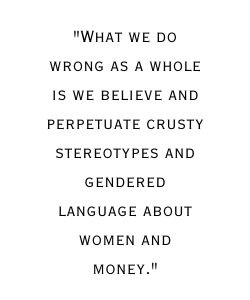
Berna Anat has made it her mission to help young BIPOC take control
of their finances. Through her podcast and social media, she has
been making complex financial concepts accessible and
understandable. Anat's new book, Money Out Loud, continues
this undertaking by covering personal finance topics like budgeting,
saving, and investing. Anat talks with us about her own experiences
with money, how capitalism perpetuates financial illiteracy, and how
to find balance with money.
 Please tell us a little about
yourself.
Please tell us a little about
yourself.
I’m a Filipina-American daughter of immigrants, born and raised in
the Bay Area. I’m an author, content creator, speaker, podcast host,
rich auntie in training and Financial Hype Woman. That’s my made-up
way of saying I create financial education media on the Internets,
specifically for young BIPOC. I’m also a double Scorpio, a former
Tahitian dancer, and if you’re gonna ask me “Have I seen (insert
movie or TV show),” the answer is probably no, because I spend a lot
of time in my bean bag, reading.
How was the topic of money treated in your family growing
up and how do you think that affected you?
Money was straight-up not a topic in my family. There’s a study from
the University of Cambridge that says we solidify our understanding
of money between the ages of 7 and 9. The only thing I was learning
about money at that age was the constant confusion between “We have
rice at home,” — a.k.a. we’re broke — and watching my family members
fight over the bill and buy things I knew we couldn’t afford, a.k.a.
we’re… not broke?
One of my core memories about money happened around the 2008 housing
crisis when my family, like so many others, were scammed by
sub-prime mortgages and had to file for bankruptcy. The silent
tension, the refusal to address anything, that quiet, sinking,
shameful feeling. For me, that added up to Adult Berna being
terrified of money, deeply ashamed of my $50,000 of debt, completely
unorganized, and yet having no boundaries when it came to spending
money on my family and friends.
 Your book Money
Out Loud is considered a young adult title, but it includes
a lot of information that many adults don’t know. Why do you think
it is that people don't learn enough about personal finances
before they have to actually deal with such matters?
Your book Money
Out Loud is considered a young adult title, but it includes
a lot of information that many adults don’t know. Why do you think
it is that people don't learn enough about personal finances
before they have to actually deal with such matters?
There are a few things that every American has in common, and one of
them? We were born into capitalism — a crappy game with crappy
rules. Really, capitalism only has one rule: Money is power. And
capitalism also depends on keeping certain folks (cough marginalized
communities) disempowered.
I believe the fact that none of us learn about money in school is
incredibly intentional: Capitalism needs busy workers. It doesn’t
need us poking holes and asking questions. Why would a system that
depends on our ignorance want us to understand how money works?
Where would US banks get their literal trillions in overdraft fees
each year if we all understood how banks worked? How would lenders
make money off of our interest fees if we all understood how to
avoid or pay down debt?
We learn nothing about money in school, so we get context clues in
our homes and our communities, where we find a whole lotta silence,
ignorance, and shame. It’s the crappiest environment to try to learn
an already difficult thing.
What is one thing you find women do wrong when it comes to
money? 
I’d say the one thing people do wrong is believe that women are
“worse” at money than men. A study from the investment app Stash
found that on average, during the peak of the pandemic, men were 17%
more likely to freak out and “panic sell” their investments, whereas
women were 63% more likely to hold tight and even increase their
investments. A 2019 CNBC survey found that men are just as likely as
women to spend on impulse buys, even spending slightly more per
purchase. And it’s not entirely our fault that we ~think~ women are
bad at money — Starling Bank studied 300 magazine articles and found
that 65% of the women & money articles characterized women as
excessive spenders, whereas 70% of the men & money articles
emphasized making more money.
What we do wrong as a whole is we believe and perpetuate crusty
stereotypes and gendered language about women and money. These
viewpoints affect our salaries, the jobs we’re hired for, the way
we’re treated in workspaces, especially in finance. Unhinged
misogynistic vibes.
Some people are spendthrifts and some are penny pinchers. How can
you make sure you have balance when it comes to money?
One important thing is, if you identify yourself as a spendthrift or
a penny pincher, take a second and (compassionately!) ask yourself
how you came to be this way. In Chapter 1 of my book, we do a little
soft dive into unpacking our financial histories. It’s harmful to
shame ourselves for being a certain way with money — you weren’t
born with “bad saver” in your blood. We gotta ask ourselves, who
taught me this? Where did I learn this? How was money treated in my
household? What core money memories affected the way I look at money
now?
We can start to empathize with our money brains, and the money
brains of those who raised us, and we can start to identify what
triggers our spend-thrift or penny-pinching instincts. For example,
my budget has always gone out the window when it comes to going out
with family — a habit I picked up from my mom, for sure. Knowing
this, and reframing it as, “I want enough money to spoil my family
from time to time,” I created a section in my budget specifically
for Spoiling My Loved Ones. That section in my budget gets refilled
once a month, and it’s separate from my rent or bills money, so I
can spend it guilt-free.
Looking back, what was the best and worst thing you did
financially?
The worst thing I ever did financially was open up that friggin’
Bank of America credit card when I was 19, because they were on my
college campus offering a cute sweater at sign-up. I had no business
having a $2,000 spending limit when I could barely manage my tiny
work-study paychecks. But what the hell did I know?! That type of
recruitment targeted folks like me. Cut to me a few years later with
$12,000 of credit card debt and no clue how I got there or how to
fix it.
But — probably hardcore confirmation bias here — the best thing I
ever did financially was share my debt journey with folks on
Instagram for the first time. Yes, it all added up to the career I
have now, but more importantly, it helped me shatter the belief that
money should be a thing we do in secret, that we gotta nurse our
shame individually. Sharing my struggles helped me learn faster from
my community, spark conversation, inspire others to do the same — to
be honest, it made me smarter, made my relationships deepen, and
made paying off debt feel like a whole-a$$ community effort.
Is there a favorite childhood memory that shaped who you
are today?
Whew! Big question! I vividly remember getting my first paycheck. I
was around 12 years old, and I was doing competitive Tahitian and
Hawaiian dancing, like so many other Filipino kids in the Bay Area.
Our group got paid to dance at a restaurant in San Francisco, and
the next week in class, our teacher handed each of us a paper check.
I have no idea how much it was, but I do know that my mom let me
spend the entire damn thing on a PC game where you could design
clothes for Barbies, print them out and color them. The idea that
you could earn money doing something you love, something you’d do
for free anyway, was wild to me. Turns out I didn’t have the chops
to become a professional dancer, but I think that “get paid to be
yourself” bug bit me pretty early.